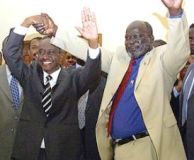Sudanese opposition hit out at govt, SPLM over constitution draft
KHARTOUM, May 7, 2005 (Sudan Tribune) — One of the Sudanese Communist Party leaders, Faruq Kadoda, has expressed surprise at the support of the Sudan People’s Liberation Movement (SPLM) for the inclusion of a clause in the draft constitution that would deny political parties, which did not recognize the constitution, the right to carry out political activities during the interim period.

|
|
Taha and Garng after the signature of thr Agreement on Security Arrangements, September 26, 2003. |
According to Al-Khartoum newspaper, Kadoda said the decision showed end of logical reasoning to the approach used by the two sides of the peace agreement: Sudan government and the SPLM. He further said the inclusion of such a clause implied end to the slogan of ‘new Sudan’, adding that both sides have managed to tailor the agreement in a way which would guarantee that they would rule Sudan alone.
He pointed out to the developments since the Machakos Agreement, saying the SPLM wanted to rule the south alone and the Salvation (ruling party) could, during the six-year transitional period, take over control of the north.
Kadoda said if the result of the referendum after the transitional period would lead to secession, then this constitution would remain in the north and by inserting this clause, the Salvation government would remain alone in power after the guaranteed elimination of other political parties.
In the same vein, a member of the National Democratic Alliance (NDA), Al-Tom Haju described this step as a strange contradiction on the part of the SPLM saying “we hope it is not true, but if this is an all-out attempt to manoeuvre us then it does not affect us.”
Speaking to Al-Khartoum, Haju said that the SPLM knew perfectly well that the NDA had reservations about some of the clauses in the peace agreement, particularly with regards to democratic change in Sudan. He added that the draft constitution was not the peace agreement which the government and SPLM had chosen to sign bilaterally with the exclusion of others’ views.
He further added that the government and SPLM were now reaping the results of this duality and exclusion.
Material provided by the BBC Monitoring Service.
